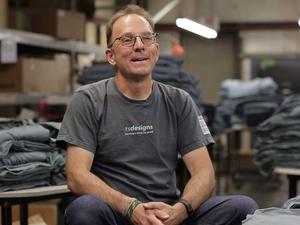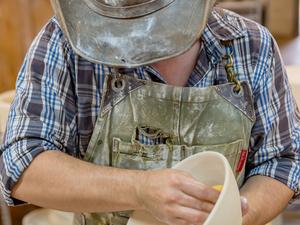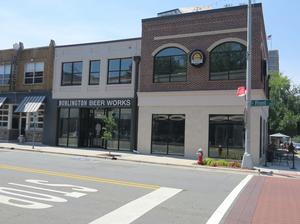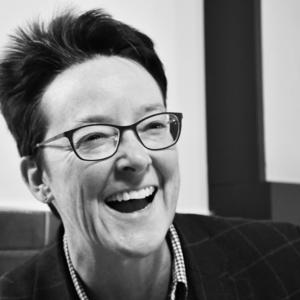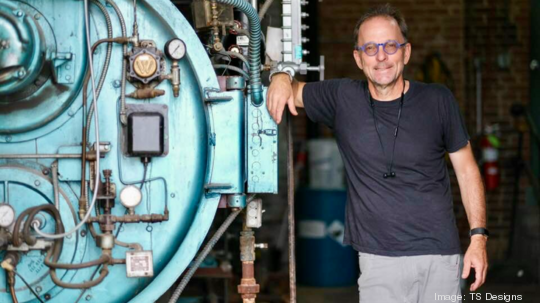
Do you know who grew the cotton used in your T-shirt? What about who spun the cotton or cut and sewed the tee?
If you bought your T-shirt from TS Designs, you can easily find out. Sewn into every shirt they produce is a QR code. Scan that code and you will be provided with all the people involved in producing your tee – including their name, photo and contact information.
To Eric Henry, TS Designs' president and long-time resident of Alamance County, this transparency is a key part of his business model.
As a student at N.C. State University in 1978, Henry launched Creative Screen Designs, which he merged with Tom Sineath in 1980 to create TS Designs. They worked for large clients such as Nike and Gap, but when the North American Free Trade Agreement was enacted in 1994, TS Designs saw many of its clients take those overseas where labor was cheaper.
After that, Henry reevaluated the bottom line of business and realized it’s not just one thing, it’s three: people, planet, profit (in that order). Since then, TS Designs, the second certified B corporation in the state, has focused on producing high quality, sustainable print apparel while paying local workers a living wage.
A typical T-shirt, from start to finish, will travel thousands of miles. A TS Designs T-shirt goes “dirt to shirt,” as Henry likes to say, in under 500 miles.
They also use a higher-quality, environmentally-friendly garment dying process called rehance, in which they print the design first before dying. The design will not crack, peel or shrink.
TS Designs is also working to quantify its carbon footprint and will work with its suppliers to further reduce it. Henry is also hopeful that the Biden administration will address climate change more, although he recognizes that businesses must step up and do more than the bare minimum required.
As an entrepreneur, Henry was also instrumental in helping start the Burlington Beer Works, which is cooperatively owned by about 2,700 people. Opened about three years ago, it was the first cooperatively owned brewery in the state and the 10th in the country. Henry liked beginning a business with a co-op model it locks the business into the community and ensures its longevity.
Here’s more from Henry in an Q&A. His answers have been edited for length and clarity.
During COVID-19, TS Designs began producing masks. Why was it important to produce them locally?
We like to say when you go outside of your market for product or service or delivery, you're cheating the system. So, we grow great cotton here, but we ship that cotton overseas, so [companies] can make cheap apparel.
Even in the darkest time of COVID during lockdown, [the company we work with] is 30 minutes away. The other advantage that we're seeing with COVID is the global apparel supply chain got broken, and you got the ship that got stuck in the Suez Canal. I don't have to worry about having those 100,000 masks sitting on a ship in the LA Harbor trying to get in. I think a lot of people are starting to realize the advantage of a more local nimble supply chain. And that conversation of price doesn't seem to be as sensitive as it used to be pre-COVID.
What is the benefit of a transparent supply chain?
I grew up in the old days of business when it was only about the bottom line of profits, and I think we are coming to the realization that there's more to it than that. Part of proving who you are is making your supply chain transparent. It builds trust because we're willing to say we are not perfect, we make mistakes, we can always do better.
When I give you the farmers’ email and picture and phone number, his address – that builds trust and confidence. You can go knock on their door, so to me it's almost like a self-regulating system. There's no secrets.
Tell me about your efforts to hasten entrepreneurship in Alamance Country.
I look at the assets within our community. I live on a farm in Snow Camp, so I'm very involved in the local farming community, like my back door neighbor is the one that supplies a hamburger at Burlington Beer Works.
When you keep your money in the community, it enriches your community. We just did a cool project at Burlington Beer Works. In this natural dye program, we actually took avocado pits and we boiled them down in the brewery kettle to make the dye for our T-shirts.
I shared that information out to the brewing industry, because what we're hoping to do there is grow local agricultural products to produce dyes – assets within our communities. I'm very interested in, because this used to be a big textile community, what are the things we can do to have that again? We have some of those assets here; we just need to reconnect. I want to help to create businesses that are meaningful to our community, and not create a business to create a business.
